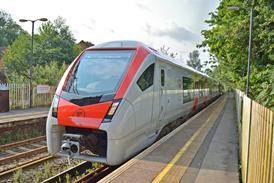NEWS REACHES us that German Railway’s Class VT611 tilting DMUs were once again withdrawn during December following a series of technical problems with the two-car sets in Rheinland-Pfalz. We have commented previously on the unfortunate tale of the VT611, which has seen the 50-strong fleet pulled in and out of service on several occasions. The immediate outcome of the present troubles is that builder Adtranz has undertaken to complete by August another programme of modifications, but it has also suggested buying the trains back from DB. This could prove a sensible move that may initiate a long-overdue switch to contracting out DB’s rolling stock maintenance, a formula that stands to benefit both operator and supplier.
The VT611 was just one of several rolling stock problems emerging across Europe at the end of last year. A cracked axle on a Class VT610 DMU, once the flagship in DB’s tilt train programme, caused some anxiety, but more serious was the withdrawal of the whole fleet with cracks in a bogie component. The units are expected back in traffic by the summer.
Earlier, Norwegian State Railways had to delay the introduction of faster inter-city schedules using its Signatur trains because of cracked axles.
Perhaps more disturbing is the situation in Britain, where whole fleets of brand-new EMUs remain stored out of use in sidings at workshops and military depots. Obtaining the necessary safety cases from Railtrack has proved to be a pointlessly long drawn-out process that no-one, despite high-level huffing and puffing, is able to accelerate. Meanwhile, trains that would barely meet the expectations of 1970s travellers - and which under current legislation must be withdrawn by December 2002 unless modified with anti-override devices - continue to carry commuters in and out of London.
January 23 saw Northern Spirit stage an inaugural commercial run with the first of its fleet of 16 Class 333 EMUs, but these should have entered service in December, with the whole fleet due to start earning its keep by this month. The delay is only measured in weeks, which is laudable compared with other trains destined for the British network. But Class 333 is cleared to run only in single unit formation on lines from Leeds to Bradford, Ilkely and Skipton, which is far less demanding than achieving a safety case for multiple-unit operation on the whole 25 kV network.
Railtrack’s safety case regime was drawn up to cope with the fragmented private-sector railway, and it is clear that the process is not working. Every train failure is ammunition for the railway’s competitors, but the inability to put modern trains into service invites ridicule at a time that could not be more critical for future confidence in the rail mode.




















